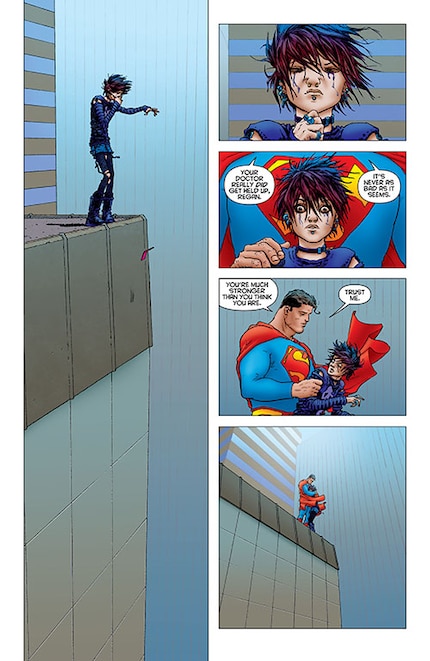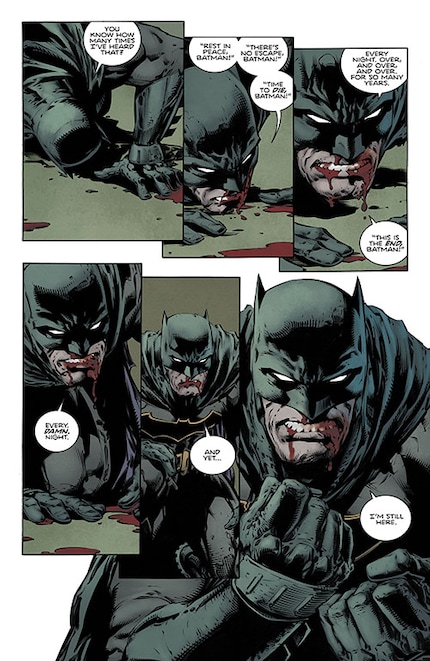
Product test
«Doctor Strange 2» – sheer madness!
by Luca Fontana

Carol Danvers is the star of the first superhero film from Marvel to be led by a woman. A milestone in cinema history? Perhaps demographically, but cinematically "Captain Marvel" seems a little botched.
Before we get started: This article contains mild thematic spoilers, not content spoilers.
Skrulls are shape-shifting aliens. They infiltrate planets. They are opposed by the Kree, a race of aliens who look pretty much exactly like humans, except that they have different eye colours. With almost fanatical hatred, Yon-Rogg (Jude Law), together with the mysterious Vers (Brie Larson) and his team of elite soldiers, hunts down the Skrull.
Vers, however, has completely different worries. She has lost her memory in a crash. Yon-Rogg is always so mean to her, calling her "emotional" and "unbalanced". If only she acted more logically, she'd be a much better warrior, even if she can already compete with the best at the moment.
During a mission on the planet Torfa, however, everything goes wrong. Although no one dies - the characters could still be needed in a sequel - Yon-Rogg's squad is infiltrated by Skrulls and in the end Vers is separated from her team, captured and tortured. But she regains her memories. They lead the Kree warrior to the planet known intergalactically as C-53. We know it as "Earth".
Captain Marvel is cinematically uninspired. There's no getting round that fact. Every element of the two-hour superhero film is already familiar from other films. The story is too weakly constructed for that.
The most obvious cliché is probably "Born Sexy Yesterday". It describes a character who is totally capable of holding her own in battle, but has such severe interpersonal flaws due to amnesia or foreign origins that she has to be led by others. Leeloo from "The Fifth Element" is the prime example of such a character. The characters who are "Born Sexy Yesterday" are mostly female. For obvious reasons. The big exception, by the way, is Thor in the first part of his trilogy of the same name.
A cliché is not necessarily a bad thing. On the contrary. One of the basic rules of writing is that a cliché must be used well. An example from the Marvel Cinematic Universe: "Captain America: The First Avenger". Steve Rogers is a leek before his transformation. Even before his transformation into the super soldier, Steve Rogers (Chris Evans) heroically throws himself onto a grenade that would have killed him with one hundred per cent certainty. Why? Because he wants to help. He is prepared to make any sacrifice to make things better for others.
All the clichés in Captain Marvel are not used well. Because I imagine the production meeting to go something like this.
Person 1: "She's supposed to be a great warrior who finds her past on Earth!"
Person 2: "But she's also supposed to be tough. She's been through a lot of setbacks in life! That inspires the target group."
Person 3: "She also has to be funny. So she has to make jokes that are relevant to pop culture."
The problem: Without a memory of an entire planet and its culture, you don't remember the setbacks of your youth and the pop culture of the 1990s. When these two elements contribute significantly to the main character and his film, it all feels somehow lovelessly cobbled together and incoherent. Brie Larson's talent and her hard training for the role are completely wasted.
Because once we've forgotten that her amnesia is not at all compatible with being a hero, we stumble into the next cliché along with all the characters in the film: "Curb-Stomp Battles".
This cliché describes fights in a film that are extremely one-sided. For example: When Bane (Tom Hardy) breaks Bruce Wayne aka Batman's (Christian Bale) back in "The Dark Knight Rises", the latter doesn't stand a chance. Bane takes blows that would have put any other opponent on the mat. Batman doesn't stand a chance.
This is exactly what happens to everyone who faces Captain Marvel alias Carol Danvers. The Skrulls shoot at her? No problem, she's got armour. If someone wants to insult Carol, they're just being a bit nasty. Yon-Rogg, for example. He's never really insulting. Captain Marvel is never really in danger. That runs from the first scene to the last.
This is a shame in that the film, its authors and its actors are not brave enough to move into territory where it really hurts. Because a heroine's journey has to have a low point, a place where Carol is in really bad shape. A place from which she has to pick herself up, rise above herself and then face the opponent who has beaten her to her lowest point.
Paradigm example: Lorraine Broughton (Charlize Theron), the film's titular "Atomic Blonde".
With the Atomic Blonde, fists fly, blood and snot flow, Lorraine receives kicks, cuts and punches. Although she wins in the end, she can barely stand up herself.
That's exactly what's missing in "Captain Marvel". The feeling that Carol Danvers, like Lorraine Brougthon, is in real danger. Aliens arrive and Carol makes short work of them. Hardly any blood, nobody dies, somehow it all loses its appeal. No matter how beautiful the computer effects are.
The worst thing about the whole film: I like Captain Marvel. The character of Carol Danvers is one of the most interesting and inspiring in the Marvel comics. A few years ago, the Carol Corps even formed, a group of fans inspired by Captain Marvel and her character. They take Carol as their role model, as a strong female character, a great heroine and a good person. Every day, online and offline, they try to pass on these values to their sons, daughters, brothers, sisters and everyone else. That is inspiration. Not the ability to beat up aliens really well.
It's clear that the makers of the Captain Marvel film want to take a leaf out of their book. Who wouldn't want to? The problem is simply that they want too much at once. Too many authors, five in total, want to tell too many stories, also five in total, while still being funny and entertaining.
This doesn't work for the most part. With a running time of just over two hours, the film has to hurry. As a result, the coherence of the story and the moments that led to the founding of the Carol Corps suffer the most: The Emotional Strength of a Hero.
In the run-up to the film, Captain Marvel was heralded as the strongest heroine (warning: video autoplay warning) in the Marvel universe. Maybe so, as she really does demonstrate a lot of physical strength. Right up to the point where three Kree Accuser ships don't even make her break a sweat. We remember: In "Guardians of the Galaxy", Starlord and the Guardians have already fled from one of these ships.
The problem with Captain Marvel's emotions is this: she doesn't have time to feel. Especially with heroes who seem physically invincible, this is of the utmost importance. Superman, a hero who can do anything, is at his strongest when he's not beating up aliens. He is at his strongest when he shows his human side.

The moments that stick in a hero's mind aren't the ones where he or she really kicks the crap out of an alien or dismantles a killer robot with their bare hands. It's the moments that we viewers or readers can identify with directly. These are the moments from which we can draw something. Tom King's Batman does this quite well in issue #20:

In the film, no one has done it better than Marvel, because when the eponymous hero is buried under a collapsed building in "Spider-Man: Homecoming", all alone, he shows his vulnerable side. We see Spider-Man with different eyes. He's a human being like you and me. He's scared, he has no way out.
These moments are completely missing in "Captain Marvel", as the film rushes through story points too quickly and never takes the time to breathe and calm down a bit. There's always something that needs to be beaten up, or "We need to go to THERE and find that thing now". The film needs more quiet, more moments where Carol can be Carol. In which we get to know her as vulnerable, human and challenging.
The "Atomic Blonde" does that perfectly. Without words.
Because if the main character seems human and vulnerable, then the big action set pieces also work better. And "Captain Marvel" has a lot of them.
Once Carol gets going and single-handedly attacks an entire fleet of Accusers, the spectacle works again. Whoever wrote the action and staged the special effects knows what he or she is doing.
The only thing that detracts from the action is the style that runs through all Marvel films. Now that Marvel has discovered beautiful saturated colours after a long grey phase following "Thor Ragnarok", the studio has also discovered black darkness for itself. One fight scene in particular, with "Just a Girl" by No Doubt playing in the background, comes off harshly. The scene is far too dark. When Carol dismantles her opponents, that's what I want to see, not just shadows swirling through the air. Marvel can do better than that. Need proof? "Captain America: The Winter Soldier" sets the standard.
Every second is brightly lit, every punch is well staged, there are quiet moments in which the characters can showcase themselves heroically or villainously. It's a shame when the aliens' colourful costumes and elaborate make-up aren't visible because it's dark. But above all, it's a shame that Brie Larson has been training hard for months - fitness, martial arts, strength - and nobody can see it. Instead, in an early scene in the film, you see the obvious stunt doubles of Jude Law and Brie Larson twirling each other around. Should also be a fight. Aha.
In the end, "Captain Marvel" is a film that could have been so much better if...
Of course, "Captain Marvel" entertains. Not particularly well, but at least you could waste two hours on sillier crap. But "Captain Marvel" is not a must-see. Unfortunately.
Journalist. Author. Hacker. A storyteller searching for boundaries, secrets and taboos – putting the world to paper. Not because I can but because I can’t not.